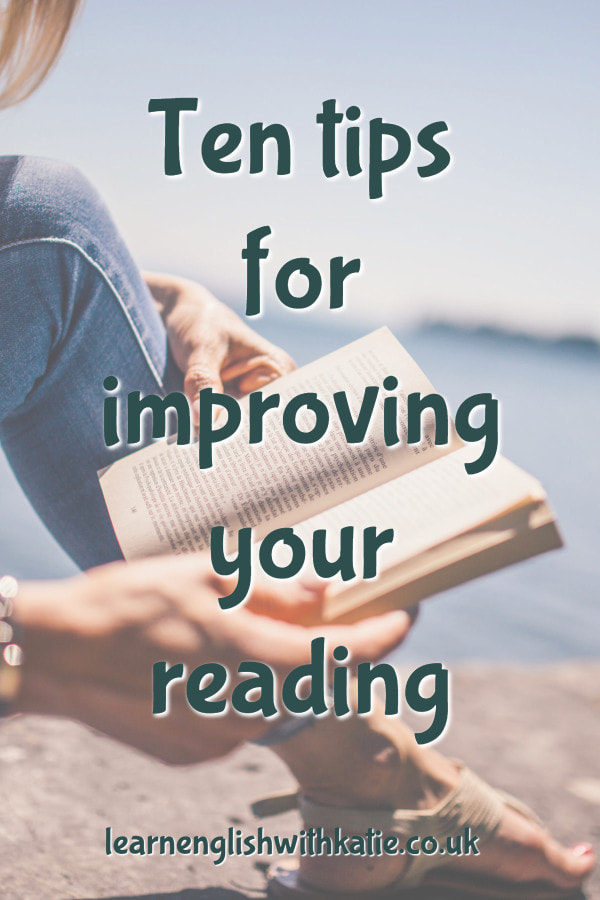|
In this post, I'll give you some tips on how to improve your reading skills and I'll explain why reading is such a great thing to do when learning a language. 1. Why read? In my opinion, reading is one of the most important things to do if you really want to improve your English because it will help you in so many ways. As well as improving your reading skills of course, it will also help you to build your vocabulary. You will find new words and, if you read often enough, the words will be repeated again and again until you remember them. Reading will also help you to develop an awareness of grammar and natural language use. All of this will even help you to speak and write better. 2. The right level Find reading materials that are the right level for you. Lower-level students might find it helpful to use materials which are created specifically for students. Some good websites with reading at different levels are: newsinlevels.com breakingnewsenglish.com engoo.com/app/daily-news learnenglish.britishcouncil.org 3. Shorter texts The above point doesn’t mean that you have to only read easy texts. At intermediate level, you could start to try some more challenging and authentic texts but start small. Short texts and website articles will be easier than an English novel! 4. Advanced reading If you are advanced, you can also read anything aimed at native speakers. Some places to start are: bbc.co.uk/news huffpost.com or huffingtonpost.co.uk bbc.com/travel bbc.com/future digg.com 5. Graded readers Search in book shops or online for graded readers. These are books written in simplified English for specific levels. The right level for you is a book with some new words but not too many. If you know all the words, perhaps it’s too easy. If you have to use the dictionary every twenty seconds, it’s probably too hard and you might get bored or lose your motivation. 6. Don't like reading? What about people who don’t like reading, even in their own language? Remember that reading doesn’t just mean books. You can read newspapers, magazines, websites, blogs, messages and social media. If books really don’t interest you, try something else. Try to find a topic that interests you. If you like sport, read the sports pages in the newspaper. If you’re into fashion, try a fashion magazine. Also just start with a few minutes a day because that’s an easy goal to reach. 7. New words What do you do with new words? Do you look up every new word in a dictionary? I think this depends on your reason for reading. If you want to improve your reading skills or pass an exam, you shouldn’t use the dictionary all the time. You should try to understand the overall meaning of the text and guess the meaning of new words from the context. However, if learning vocabulary is your aim, then maybe you should use the dictionary. Even so, it’s still a good idea to try to guess what a word means before you check. Another idea would be to try to read a page without a dictionary and underline words you’re not sure about, then go back and check the meaning afterwards. 8. Active reading Before you read, you might want to ask yourself some questions. What do you want to learn from this text? Alternatively, you could try to predict what the text will say or what’s going to happen next in the story. These techniques can improve your comprehension. 9. Comprehension Test your understanding of what you are reading. After reading, try to tell somebody about what you have just read. If you don’t have somebody to do that with, say it to yourself in your head or write a summary. 10. Read and listen In a post about listening skills, I suggested reading and listening at the same time, for example by watching videos with subtitles. Some graded readers also come with CDs. There are websites and apps which allow you to read and listen together, such as beelinguapp and learningenglish.voanews.com. Maybe you know the words when you hear them but don’t know the spelling so don’t recognise the words when you see them. This technique could help you. For more ideas for useful websites for reading, visit this post. To get my free newsletters, full of useful tips for learning English, click the button below:
2 Comments
Katie
25/1/2021 06:14:32 pm
Hi Winnie! Thanks for your comment. I'm glad this post helped you!
Reply
Your comment will be posted after it is approved.
Leave a Reply. |
About the blogFollow the blog for mini lessons and tips on how to improve your English. Categories
All
Archives
July 2024
|

 RSS Feed
RSS Feed
